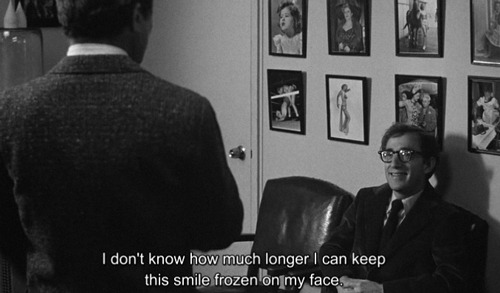sexta-feira, 28 de dezembro de 2012
c'est la vie
Alguém? me ajude, por favor, pisaram em meu peito, sinto meu coração explodindo, sinto todo meu ser se esvaindo. Mas dizem que este sentimento é normal, como as fotografias em preto e branco, monocromáticas, tristes e estáveis. C'est la vie
segunda-feira, 17 de dezembro de 2012
terça-feira, 11 de dezembro de 2012
God dies
Lembrei hoje do texto que Frances Farmer escreveu quando adolescente e acho válido ter ele aqui no blog, seja pra lembrar dessa inexistência de Deus ou da existência dessa atriz.
No one ever came to me and said, "You're a fool. There isn't such a thing as God. Somebody's been stuffing you." It wasn't a murder. I think God just died of old age. And when I realized that he wasn't any more, it didn't shock me. It seemed natural and right.
Maybe it was because I was never properly impressed with a religion. I went to Sunday school and liked the stories about Christ and the Christmas star. They were beautiful. They made you warm and happy to think about. But I didn't believe them. The Sunday School teacher talked too much in the way our grade school teacher used to when she told us about George Washington. Pleasant, pretty stories, but not true.
Religion was too vague. God was different. He was something real, something I could feel. But there were only certain times when I could feel it. I used to lie between cool, clean sheets at night after I'd had a bath, after I had washed my hair and scrubbed my knuckles and finger nails and teeth. Then I could lie quite still in the dark with my face to the window with the trees in it, and talk to God. "I am clean, now. I've never been as clean. I'll never be cleaner." And somehow, it was God. I wasn't sure that it was … just something cool and dark and clean.
That wasn't religion, though. There was too much of the physical about it. I couldn't get that same feeling during the day, with my hands in dirty dish water and the hard sun showing up the dirtiness on the roof-tops. And after a time, even at night, the feeling of God didn't last. I began to wonder what the minister meant when he said, "God, the father, sees even the smallest sparrow fall. He watches over all his children." That jumbled it all up for me. But I was sure of one thing. If God were a father, with children, that cleanliness I had been feeling wasn't God. So at night, when I went to bed, I would think, "I am clean. I am sleepy." And then I went to sleep. It didn't keep me from enjoying the cleanness any less. I just knew that God wasn't there. He was a man on a throne in Heaven, so he was easy to forget.
Sometimes I found he was useful to remember; especially when I lost things that were important. After slamming through the house, panicky and breathless from searching, I could stop in the middle of a room and shut my eyes. "Please God, let me find my red hat with the blue trimmings." It usually worked. God became a super-father that couldn't spank me. But if I wanted a thing badly enough, he arranged it.
That satisfied me until I began to figure that if God loved all his children equally, why did he bother about my red hat and let other people lose their fathers and mothers for always? I began to see that he didn't have much to do about hats, people dying or anything. They happened whether he wanted them to or not, and he stayed in heaven and pretended not to notice. I wondered a little why God was such a useless thing. It seemed a waste of time to have him. After that he became less and less, until he was…nothingness.
I felt rather proud to think that I had found the truth myself, without help from any one. It puzzled me that other people hadn't found out, too. God was gone. We were younger. We had reached past him. Why couldn’t they see it? It still puzzles me.
segunda-feira, 10 de dezembro de 2012
quarta-feira, 5 de dezembro de 2012
Das elucidações do mal à criação do mundo
- Autor
do mal, quem sois?
Ele
próprio se horrorizou com esta idéia e quis investigar se, para existir, o mal
tinha necessariamente que ter sido criado. Em seguida, examinou a mesma questão
numa perspectiva mais abrangente. Concentrou-se nas forças da natureza,
atribuindo à matéria uma energia que lhe pareceu apta a explicar tudo, sem que
fosse preciso recorrer à criação.
No
tocante ao homem e aos animais, segundo ele estes deviam a existência a um
ácido gerador, o qual, ao provocar a fermentação da matéria, imprimia-lhe
formas constantes, mais ou menos da maneira como os ácidos cristalizam as bases
alcalinas e terrosas sempre no mesmo tipo de poliedros. Ele considerava as
substâncias fungosas produzidas pela madeira úmida o elo que liga a
cristalização dos fósseis e a reprodução dos vegetais e dos animais, e que
indica, se não a identidade de ambas, pelo menos a analogia existente entre
ambas.
Hervas,
como o erudito que era não teve dificuldades em dar embasamento sólido a seu
falso sistema por intermédio de provas sofísticas bem apropriadas a desnortear
qualquer espírito. Ele achava, por exemplo, que os mulos, que resultavam do
cruzamento de duas espécies, podiam ser comparados aos sais com base composta
cuja cristalização é confusa. A efervescência de certas terras com os ácidos lhe
pareceu bem próxima da fermentação dos vegetais mucosos, e esta lhe pareceu ser
um começo de vida que não tinha podido se desenvolver por falta de condições
propícias.
Hervas
tinha notado que os cristais, ao se formarem, se amontoavam nas partes mais
iluminadas do recipiente, e dificilmente se constituíam no escuro; e como a luz
é igualmente favorável à vegetação, ele considerou que o fluido luminoso era um
dos elementos que compunham o ácido universal que animava a natureza; aliás,
ele tinha acompanhado a luz avermelhar com o tempo os papéis tingidos de azul,
e esta era outra das razões que o levavam a tê-lo como um ácido.
Hervas sabia
que nas altas latitudes, perto do pólo, o sangue, por falta de calor
suficiente, estava exposto a uma alcalescência que não se podia interromper
senão pelo uso interno dos ácidos. Donde concluiu que, já que o calor podia
ser, em determinadas circunstâncias, substituído por um ácido, ele próprio
devia ser uma espécie de ácido, ou pelo menos um dos elementos do ácido
universal. (POTOCKI, Jean. O manuscrito encontrado em Saragoça. p. 259 - 260)
Assinar:
Postagens (Atom)

